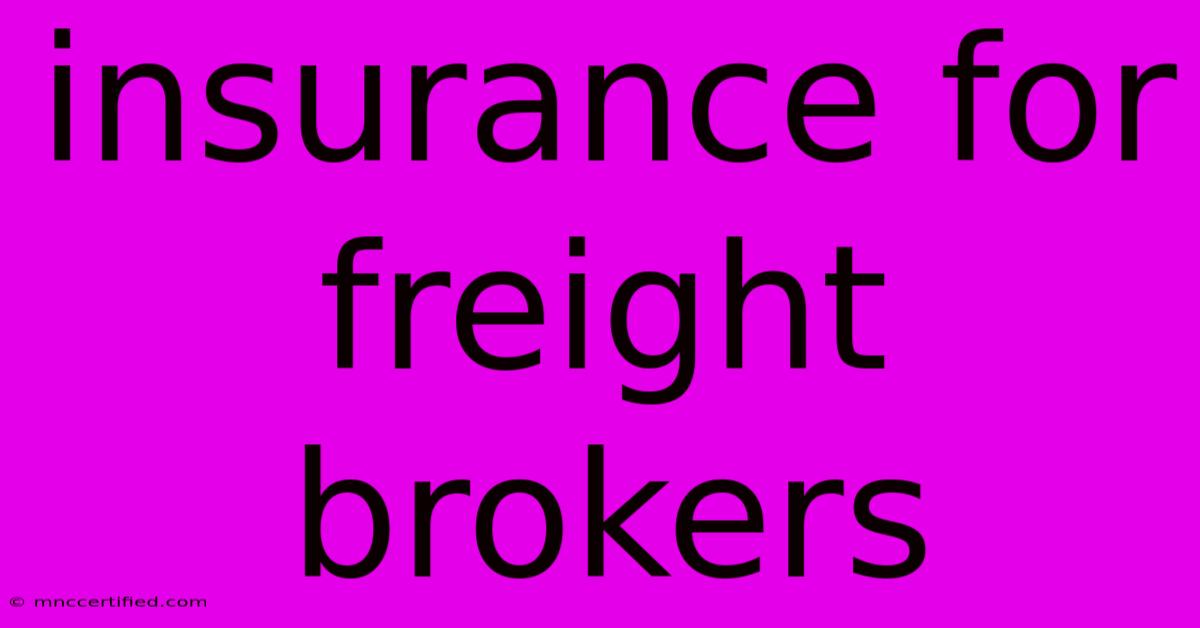Insurance For Freight Brokers

Table of Contents
Insurance for Freight Brokers: A Comprehensive Guide
Finding the right insurance is crucial for freight brokers. The industry is complex, and without adequate coverage, you risk significant financial losses from accidents, lawsuits, and other unforeseen events. This comprehensive guide will walk you through the essential insurance types needed for freight brokers and how to secure the best policies.
Why Freight Brokers Need Specialized Insurance
Freight brokers act as intermediaries, connecting shippers with carriers. This seemingly straightforward role carries substantial liability. A single mishap can result in hefty legal fees, cargo damage claims, and operational disruptions. Therefore, securing the appropriate insurance isn't just advisable—it's a necessity for protecting your business and financial stability.
Key Risks Faced by Freight Brokers:
- Cargo Loss or Damage: Even if you don't own the cargo, you can be held liable if you fail to select a reliable carrier or if the contract you brokered contains shortcomings.
- Accidents Involving Carriers: While the carrier usually holds primary liability, you could face claims if you were negligent in selecting them or overseeing the shipment.
- Errors and Omissions: Mistakes in paperwork, contract negotiation, or dispatching can lead to substantial financial repercussions.
- General Liability: Protecting your business from claims related to property damage, bodily injury, or advertising injury on your premises is crucial.
- Cybersecurity Risks: Data breaches involving sensitive customer and carrier information can result in significant legal and financial penalties.
Essential Insurance Policies for Freight Brokers
Understanding the various insurance types is crucial for effective risk management. Here's a breakdown of essential policies:
1. General Liability Insurance: This covers bodily injury or property damage caused by your business operations, protecting you from lawsuits arising from accidents on your premises or those resulting from your negligence.
2. Errors and Omissions (E&O) Insurance: Often called professional liability insurance, this protects your business from financial losses resulting from mistakes or negligence in your professional services, such as mismatched shipments or incorrect documentation. This is particularly vital for freight brokers.
3. Cargo Insurance: While you typically don't own the cargo, securing cargo insurance can protect you from liability in case of loss or damage during transit. This can be a significant advantage when negotiating contracts and builds trust with clients.
4. Auto Liability Insurance (if you own vehicles): If your business uses vehicles for transportation or delivery, auto liability insurance is essential to cover accidents involving your company's vehicles.
5. Cyber Liability Insurance: In today's digital age, protecting sensitive data is paramount. Cyber liability insurance helps cover expenses related to data breaches, including legal fees, notification costs, and credit monitoring for affected individuals.
Finding the Right Insurance Provider
Choosing the right insurance provider requires careful consideration. Factors to consider include:
- Coverage Limits: Ensure the policy limits are sufficient to cover potential losses.
- Premium Costs: Compare premiums from multiple providers to find the best value for your needs.
- Reputation and Financial Stability: Choose a reputable provider with a strong financial standing to ensure they can meet their obligations in case of a claim.
- Customer Service: A responsive and helpful customer service team can make a significant difference in handling claims and resolving issues.
Tips for Reducing Insurance Costs
While comprehensive insurance is vital, you can take steps to lower your premiums:
- Implement a robust safety program: Demonstrating a commitment to safety can reduce your risk profile and potentially lower your premiums.
- Maintain accurate records: Meticulous record-keeping of all transactions and communications can help you avoid errors and omissions claims.
- Invest in employee training: Training employees on best practices and safety procedures can help prevent accidents and reduce liability.
- Bundle policies: Some insurers offer discounts when you bundle multiple policies, such as general liability and E&O insurance.
Conclusion
Securing the right insurance is a crucial aspect of running a successful and sustainable freight brokerage business. By understanding the various types of insurance available and selecting the right coverage, you can protect your business from significant financial risks and build a strong foundation for long-term growth. Don't hesitate to consult with an insurance professional to determine the most appropriate coverage for your specific needs and risk profile. Remember, proactive risk management is key to thriving in the competitive freight brokerage industry.

Thank you for visiting our website wich cover about Insurance For Freight Brokers. We hope the information provided has been useful to you. Feel free to contact us if you have any questions or need further assistance. See you next time and dont miss to bookmark.
Featured Posts
-
North Dakota Dental Insurance
Nov 28, 2024
-
Stars React Vanderpump Rules Cast Expands
Nov 28, 2024
-
Ionic Or Covalent Bonding Lab
Nov 28, 2024
-
How To Invest In Fanbase Stock
Nov 28, 2024
-
Fig Financial Insurance Group
Nov 28, 2024